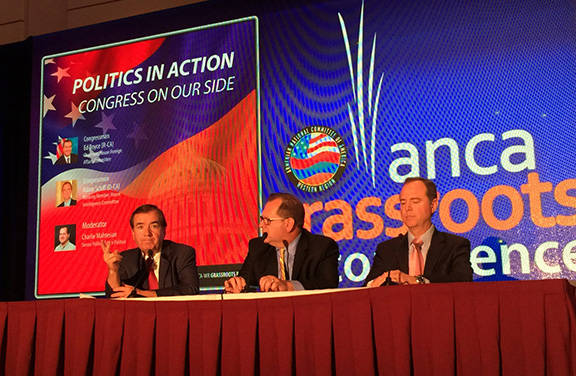PASADENA, Calif.—House Foreign Affairs Committee Chairman Ed Royce (R-Calif.) and House Intelligence Committee Ranking Democrat Adam Schiff (Calif.) are backing an Armenian National Committee of America initiative to establish a new U.S. Millennium Challenge Corporation (MCC) grant that could turn Armenia into the “Silicon Valley” of the region. Their support for this bilateral accord was shared at the ANCA Western Region Grassroots Conference panel, titled “Politics in Action: Congress on our Side,” moderated by Politico Senior Politics Editor Charlie Mahtesian.
“We welcome the leadership of Chairman Royce and Representative Schiff in helping to realize the transformative potential of a $100 million MCC Science, Technology, Engineering, and Mathematics grant for Armenia,” said ANCA Chairman Raffi Hamparian. “Securing this major investment in Armenia’s educational system represents a core ANCA advocacy priority, a key element of our 360-degree advocacy program to strengthen Armenia economically, grow U.S.-Armenia relations, defend Artsakh’s security, and end U.S. complicity in Ankara’s obstruction of justice for the Armenian Genocide.”
As part of extensive and in-depth remarks that ranged across a number of policy areas, Chairman Royce noted that “using the Millennium Challenge Corporation to address some of the capacity issues in Armenia with respect to trade and investment could go a very long way.” He praised the “pool of people in Armenia who – frankly – have just such unlimited capacity with respect to technological advancement.”
Rep. Schiff explained that “Armenia for some time has been on the cusp [of eligibility for a MCC grant],” citing the previous grant of over $200 million received in 2006 for rural development. “This [new MCC grant] would be focused on STEM [Science, Technology, Engineering and Math] education – and I think it is a fantastic concept for a STEM project in Armenia – that can really develop those technological gifts and talents of the Armenian people – and, can overcome the economic barriers by its neighbors,” stated Rep. Schiff, who went on to stress, “why can’t Armenia become like Silicon Valley?”.
Rep. Schiff also discussed that an MCC grant could also go a long way in increasing investor confidence in Armenia. “Many of you who travel frequently to Armenia and to the region – others of you who have invested in Armenia – understand that the potential for economic development would be that much further along if we can make additional progress in terms of protecting peoples’ investments there. The MCC process really works at both levels, because it helps the country adopt greater accountability and transparency and make important legal reforms – on the one hand – to encourage investment. And on the other hand – if we are successful with this [MCC STEM] program – we will give young people the skills there [Armenia] to compete economically, to bring commerce there. It will be a win-win situation. And that is exactly what we look for in a Millennium Challenge program.”
Watch excerpts of the video of Chairman Royce and Rep. Schiff’s remarks, first broadcast live on Facebook by Asbarez News.
Parallel to discussions with Congress and the Administration, the ANCA has held talks with U.S. universities and interested in partnering on an MCC Armenia compact. The MCC is an independent U.S. foreign aid agency, established by Congress in 2004 and charged with leading the fight against global poverty. Country-specific programs are selected by the MCC board through a competitive selection process, based on its review of a broad range of merit-based governance criteria. Since its launch, MCC provided over $10 billion in grants, including a grant in 2006 to Armenia for rural roads and irrigation.
Last year ANCA Chairman Raffi Hamparian praised past MCC support for Armenia in an op/ed, noting: “As much as the first MCC grant accomplished, there is much more to be done. A second compact holds the potential to deliver a new round of transformative change to Armenia, at a truly pivotal moment in Armenia’s development. Such a future compact could, for example, provide hundreds of millions of dollars to empower Armenia’s public school students with the advanced STEM education required in the rapidly evolving 21st Century workforce. Such a grant would add new energy to Armenia’s growing IT sector, promoting the development of an advanced and sustainable Armenian economy fully integrated into the international financial system.”
